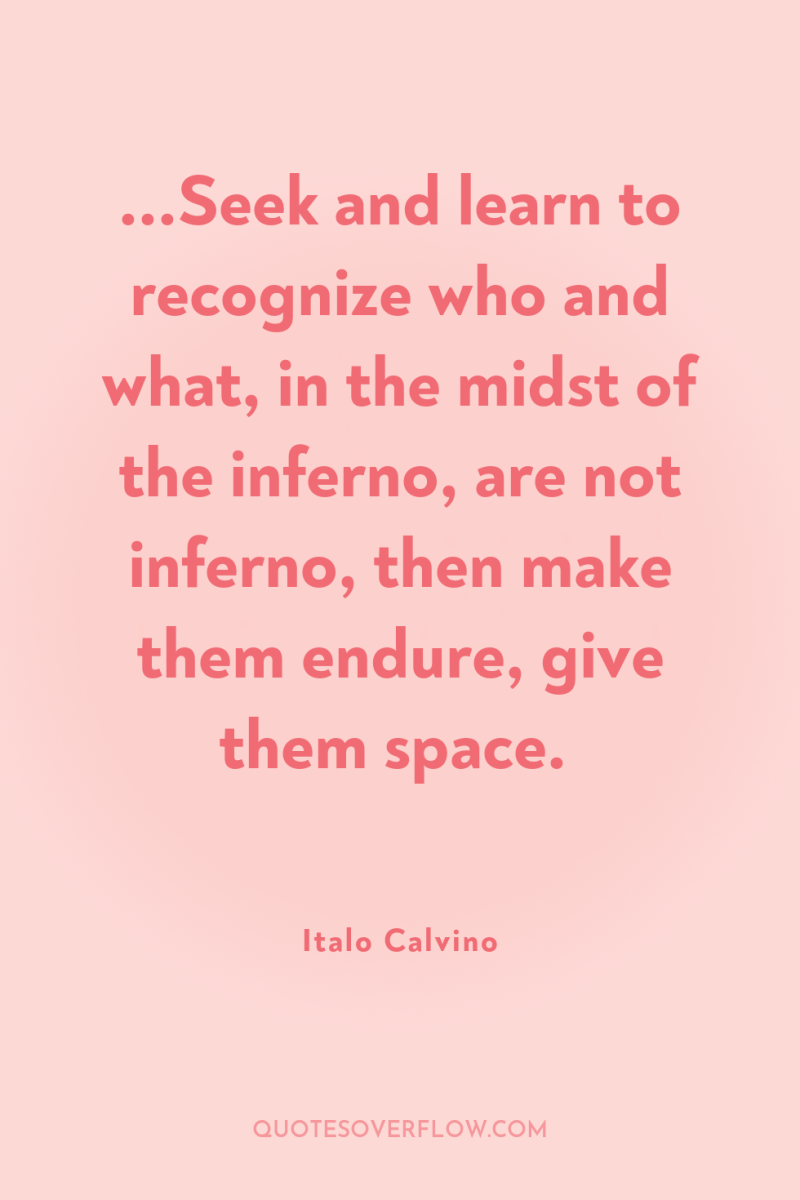
1
...Seek and learn to recognize who and what, in the midst of the inferno, are not inferno, then make them endure, give them space.Italo Calvino
2
Perhaps everything lies in knowing what words to speak, what actions to perform, and in what order and rhythm; or else someone's gaze, answer, gesture is enough; it is enough for someone to do something for the sheer pleasure of doing it, and for his pleasure to become the pleasure of others: at that moment, all spaces change, all heights, distances; the city is transfigured, becomes crystalline, transparent as a dragonfly.Italo Calvino
3
You walk for days among trees and among stones. Rarely does the eye light on a thing, and then only when it has recognized that thing as the sign of another thing: a print in the sand indicates the tiger's passage; a marsh announces a vein of water; the hibiscus flower, the end of winter. All the rest is silent and interchangeable; trees and stones are only what they are.Italo Calvino
4
The city of Leonia refashions itself every day: every morning the people wake between fresh sheets, wash with just-unwrapped cakes of soap, wear brand-new clothing, take from the latest model refrigerator still unopened tins, listening to the last-minute jingles from the most up-to-date radio. On the sidewalks, encased in spotless plastic bags, the remains of yesterday's Leonia await the garbage truck. Not only squeezed tubes of toothpaste, blown-out light bulbs, newspapers, containers, wrappings, but also boilers, encyclopedias, pianos, porcelain dinner services. It is not so much by the things that each day are manufactured, sold, bought, that you can measure Leonia's opulence, but rather by the things that each day are thrown out to make room for the new. So you begin to wonder if Leonia's true passion is really , as they say, the enjoyment of new things, and not, instead, the joy of expelling, discarding, cleansing itself of a recurrent impurity. The fact is that street cleaners are welcomed like angels.Italo Calvino
5
What he sought was always something lying ahead, and even if it was a matter of the past it was a past that changed gradually as he advanced on his journey, because the traveller's past changes according to the route he has followed: not the immediate past, that is, to which each day that goes by adds a day, but the more remote past. Arriving at each new city, the traveller finds again a past of his that he did not know he had: the foreignness of what you no longer are or no longer possess lies in wait for you in foreign, unpossessed places.Italo Calvino
6
Journeys to relive your past?' was the Khan's question at this point, a question which could also have been formulated: 'Journeys to recover your future?' And Marco's answer was: 'Elsewhere is a negative mirror. The traveller recognizes the little that is his, discovering the much he has not had and willnever have.Italo Calvino
7
Signs form a language, but not the one you think you know.Italo Calvino
8
Memory's images, once they are fixed in words, are erased.Italo Calvino
9
In the streets of Cecilia, an illustrious city, I met once a goatherd, driving a tinkling flock along the walls." Man blessed by heaven, " he asked me, stopping, "can you tell me the name of the city in which we are?"" May the gods accompany you! " I cried. "How can you fail to recognise the illustrious city of Cecilia?""Bear with me, " that man answered. "I am a wandering herdsman. Sometimes my goats and I have to pass through cities; but we are unable to distinguish them. Ask me the names of the grazing lands: I know them all, the Meadow between the Cliffs, the Green Slope, the Shadowed Grass. Cities have no name for me: they are places without leaves, separating one pasture from another, and where the goats are frightened at street corners and scatter. The dog and I run to keep the flock together."" I am the opposite of you, " I said. "I recognise only cities and cannot distinguish what is outside them. In uninhabited places each stone and each clump of grass mingles, in my eyes, with every stone and clump.Italo Calvino
10
Cities also believe they are the work of the mind or of chance, but neither the one nor the other suffices to hold up their walls. You take delight not in a city's seven or seventy wonders, but in the answer it gives to a question of yours. or to the question it asks you, forcing you to answer, like Thebes through the mouth of the Sphinx.Italo Calvino